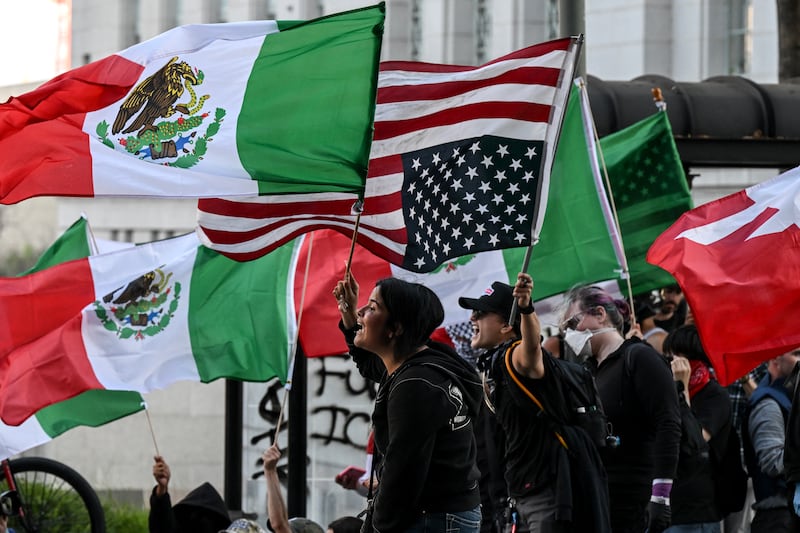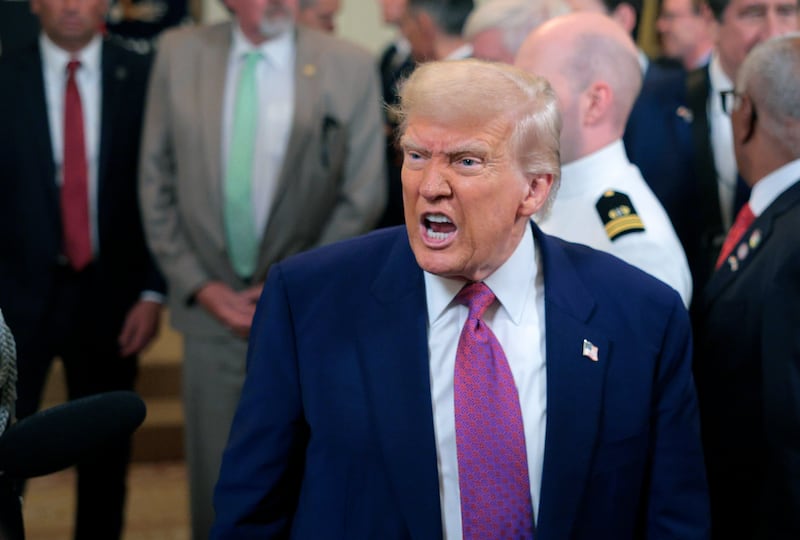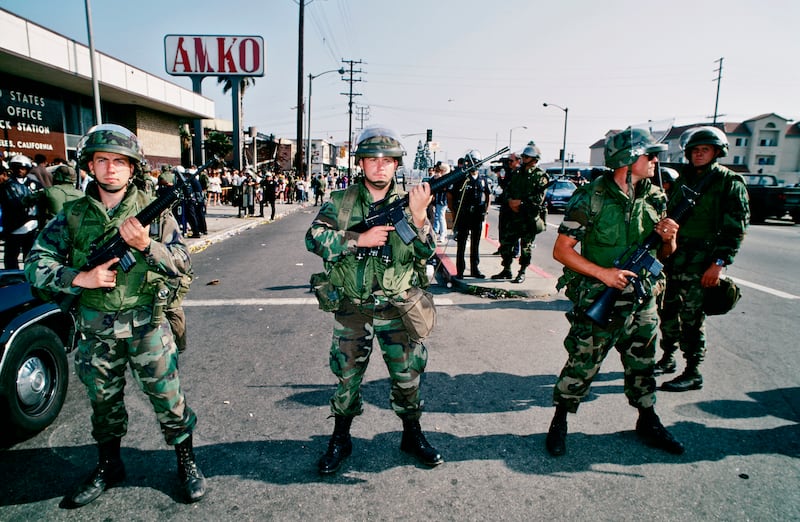The White House knew that conducting ICE raids in the heart of Los Angeles—where 40 percent of the population is Latino and one in 10 is undocumented—would create a stir. Masked ICE agents in unmarked cars grabbed people at work and at immigration offices, chasing a daily quota that, at Stephen Miller’s directive, had jumped from 600 a day to 3,000, running roughshod over communities across the city.
What happened next was predictable: Angelenos protested—as did many in other cities where immigration crackdowns were being scaled up at warp speed—and Trump saw an opportunity. Still smarting over the missed opportunity that was using U.S. troops to quell civil unrest over the death of George Floyd at the hands of Minneapolis police in 2020, Trump activated the National Guard without bothering to consult California officials, and then, adding insult to injury, sent 2,000 Marines to a situation that the local police had under control.

It’s the fight of the week, maybe the summer—one in which federal rights trample state’s rights underfoot. We’re getting a glimpse of what could lie ahead in Trump’s “us versus them” America. He’s openly talking about invoking the Insurrection Act of 1807 to deploy the military nationally. (Much as he likes tossing around the word, he has never applied it to those Jan. 6 rioters, who met its classic definition by storming the U.S. Capitol and occupying federal property.)
Why has he authorized these unnecessary and expensive ($134 million) deployments? “Because it feels good—he’s manly, macho, and it’s cinematic. And part of it may be that he’s setting the stage to cancel elections. If we end up with troops in the street, it’s hard to have a functional civil democracy,” argues Steven Cash, a former intelligence officer who is now the executive director of The Steady State, a group of 180 former national security and intelligence professionals who have served Republican and Democratic administrations. “Canceling elections is a fixture in many countries as they descend into autocracy.”
Could Cash be onto something? Exactly what Trump is up to is limited only by our imagination, but it can’t be anything good. This is a man who wants to rule as a monarch, and is doing whatever he can to expand his executive authority. The potential for widespread civil unrest leading up to next year’s midterms seems to be growing. Indeed, Republicans think that’s a winner for them. But why would he bother with elections if he feels popular opinion isn’t going his way?
“Everybody says he can’t do this, he can’t do that,” adds Cash. “Until he does. It’s very evident to those of us who worked overseas where the standard, in many places, is to act quickly, and that it doesn’t actually matter what the law is.”

Two recent examples of leaders whom Trump admires who retained power in such a manner are Venezuelan President Nicolás Maduro, who in 2024 warned voters of a “bloodbath” if he lost re-election and then didn’t release the full vote count after claiming victory, and El Salvador’s President Nayib Bukele, who used a legislative majority to replace judges with those who re-interpreted his country’s Constitution so he could run again. Trump recently hosted Bukele in the Oval Office.
To cancel a federal election or change its date requires congressional approval. Well, raise your hand if you’re confident today’s GOP majorities would defy Trump on such a move—or that Trump would then back off. He has three options, Cash explained:
- One: sign an executive order with all the flourishes and assume everyone will rush to carry it out just as with his many other bogus directives—and dare the courts to catch him if they can.
- Two: declare a state of emergency that makes it impossible to hold an election. Trump is good at this. He got free sway in California by claiming the state is the victim of a “migrant invasion.”
- Three: under the guise of free and fair elections, narrow the electorate by shutting down polling sites, increasing police presence, inviting militias such as the Proud Boys to create intimidation.
Los Angeles is a test case, and so far, the politics are working just like Trump and his Project 2025 handlers predicted they would. Will the Supreme Court rule against this militarization? It’s been sacrosanct that only under the rarest of times are federal troops turned against American citizens. The last time was 1992 (also in Los Angeles) amid the riots sparked by the arrest and beating of Rodney King—when the then-governor of California and other local officials requested assistance.

But counting on the courts to save us is problematic—and Trump is learning all sorts of ways to exploit the judicial branch’s weak points. “If he tells us now (in June 2025) that he’s canceling the election, everybody will be in court, and there will be time. If he tells us on Nov. 3, 2026, it’s very unlikely to get a court ruling quickly enough and empowered enough that would be followed,” Cash told the Daily Beast. “The courts are not well designed for making emergency decisions in a crisis like that which he would have created.”
A new Quinnipiac University poll has Trump’s approval rating dipping to 38 percent, with a disapproval of 54 percent. Voters support his policy of removing people who are in the country illegally, but they don’t like the snatch-and-grab Gestapo tactics. Compounding the bad news for Trump, a flash poll conducted by YouGov finds nearly half (47 percent) of Americans disapprove of sending the Marines to Los Angeles.
Trump is placing a big bet on his base making the leap from the law and order president to a commander in chief brandishing the military like his personal honor guard. With Congress bending to Trump’s will and the courts slow to react, free, fair elections are our last, best hope to keep dictatorship at bay. Voters are paying attention, and if they don’t like what they see, Trump can be stopped.
The post Opinion: Trump Doesn’t Just Want Troops in LA. He Wants Them at the Polls appeared first on The Daily Beast.




